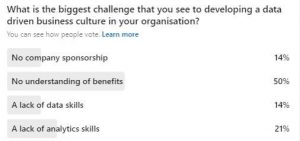NEW ICBE PROGRAMME DEVELOPMENT |
The importance of Data Analytics for companies in Ireland
 How would you answer this interesting question from a recent poll?
How would you answer this interesting question from a recent poll?
While the technical skills of working with data using analytics are important, the lack of those skills is not a primary factor in stopping organisations becoming data driven. In 2019, the Irish Centre for Business Excellence (ICBE) received feedback from members that they needed to improve the overall data literacy of their organisations. The term data literacy describes a skill that enables people to explain how data can be used to solve a business problem / reduce cost or improve a company’s revenue.
Others might term this as use case story telling. Fundamentally, what ICBE members were alluding to was the inability of their organisations to understand the benefits of becoming data driven. By not understanding the benefits, they could not come up with the Return on Investment (ROI) hypothesis for project funding asks and thus were lacking in appropriate company sponsorship.
![]()

To show by example how taking a data driven approach might have real tangible benefits to a company, let us consider a couple of examples of use cases in organisations similar to the ICBE member base. The first is a drinks company. The company is hearing customer complaints of differing levels of service by their distributors in clusters of their customers that was leading to dis-satisfaction within their long standing customer base and risking significant revenue loss if not addressed. While a widespread interviewing of customers on the topic would have been problematic, an investigation of the order, sales, and delivery frequency within specific geographic regions across the country was able to yield specific customers which may be of risk of being dis-satisfied due to the inequality in their delivery schedules compared to other customers. This allowed a targeted client management initiative and reduced the revenue loss risk.
A second use case is a classic manufacturing use case. Every manufacturer looks to maximise and optimise their product yield. This has clear benefits in terms of reduced scrap, increased revenue, better margins. While every manufacturer is different, a proper analysis of this cannot be undertaken witout looking at the data that the organisation has on their manufacturing process. Six Sigma has long been used as the quality methodology standard bearer when it comes to addressing manufacturing production issues. But, the Six-Sigma Define-Measure-Analyse-Improve-Control (DMAIC) methodology ocurs after a problem has happened. Data Analytics methods use methodologies that help to find those key levers of product quality so that issues can be predicted and avoided before they happen. Those levers can also be used to create a more efficient process. What does the value of being able to manufacture additional batches of pharmaceutical product within a year equate to in monetary terms?
For more information on Data Analtics programmes offered by ICBE, visit www.icbe.ie or contact the centre.




